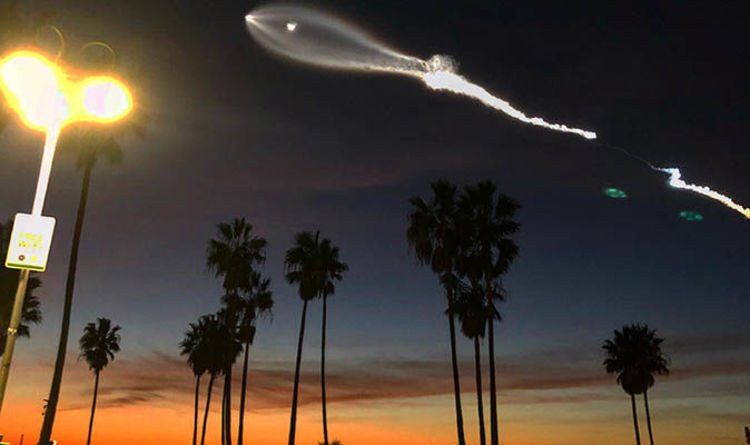SpaceX completed its 100th orbital launch of the year for its Falcon family of rockets late Saturday night in California, reaching this first-time milestone by launching OneWeb’s final batch of its first generation internet satellites. The mission, dubbed OneWeb Launch #20, lifted off from Vandenberg Space Force Base at 10:13 p.m. PDT on Saturday, Oct. 19 (1:13 a.m. EDT, 0513 UTC on Sunday, Oct. 20).
The Falcon 9 first stage booster for this mission, tail number B1082 in the SpaceX fleet, launched for a seventh time. It previously supported USSF-62 and five Starlink missions. A little less than eight minutes after liftoff, B1082 returned to Vandenberg for a propulsive touchdown at Landing Zone 4 (LZ-4). This made the 21st booster landing at LZ-4 and the 77th land landing for SpaceX to date.
The mission caps off a busy week for SpaceX, which also saw the launches of its Starship rocket, a Falcon Heavy rocket and three other Falcon 9 rockets. So far in 2024, SpaceX launched 98 Falcon 9 rockets and is scheduled to launch its 99th Falcon 9 on Monday, Oct. 21, on the Starlink 6-61 mission from Cape Canaveral Space Force Station.
The journey to cap off the first generation of OneWeb’s satellite internet constellation has been anything but a straight line to the end. OneWeb had to turn to multiple launch providers to complete its constellation of 634 satellites with Launch 19 on May 20, 2023. It’s original plan for the Gen. 1 constellation was to have 648 satellites in orbit. The 20 satellites onboard Launch #20 will put it well over that threshold.
OneWeb's Journey to Global Coverage
The first batch of six satellites launched on Feb. 27, 2019 on a Soyuz rocket, which lifted off from French Guiana. The company hoped to begin monthly launches starting in January 2020, but Launch #2 didn’t happen until February 2020, when 34 satellites launched on a Soyuz rocket from the Baikonur Cosmodrome. While the third launch did happen about a month later out of Baikonur, the fourth launch from Russia’s Vostochny Cosmodrome was delayed until December 2020 due to OneWeb’s bankruptcy woes and subsequent acquisition by Bharti Global, an Indian conglomerate, and the UK government.
The fifth, sixth, seventh and eighth launches took place at Vostochny on March 25, April 25, May 27 and July 1 respectively. Launch #9 saw a return to Baikonur on Aug. 22, 2021, adding another 34 satellites to bring the total of 288 on orbit at that point. Launch #10 lifted off from Baikonur on Sept. 14, 2021, Vostochny for Launch #11 on Oct. 14, 2021, back to Baikonur for Launch #12 on Dec. 27, 2021, and then back to French Guiana for Launch #13 on Feb. 10, 2022.
However, OneWeb hit a big roadblock as it heading into the planned Launch #14 mission. With Russia’s invasion of Ukraine, OneWeb announced its suspension of ties with Roscosmos just days before the planned launch in March 2022. The satellites for that mission remain in Russia to this day. “The Board of OneWeb has voted to suspend all launches from Baikonur,” OneWeb said in a brief statement at the time. The company wasn’t happy to lose its launch provider, since it was will under contract with Arianespace to fly onboard six more Soyuz rockets to complete its constellation.
Later in March, OneWeb announced launch agreements with both SpaceX and the Indian Space Research Organization to launch its remaining satellites on three Falcon 9 rockets and two Launch Vehicle Mark-3 (LVM3) rockets. Those Falcon 9 launches took place on Dec. 8, 2022, Jan. 10, 2023, and Mar. 9, 2023, (Launch #15, #16 and #17 respectively) from Cape Canaveral Space Force Station, close to where the satellites are manufactured at the Airbus OneWeb Satellites facility on Merritt Island. ISRO completed Launch #14 and #18 on Oct. 22, 2022, and March 25, 2023, from the Satish Dhawan Space Centre in Sriharikota, India.
OneWeb then announced in May 2023 that it was planning to launch another 16 satellites onboard the Launch #19 mission from Vandenberg Space Force Base, which included a demonstration satellite for its Gen. 2 fleet called “JoeySat.” “Developed through the European Space Agency and UKSA Sunrise Partnership programme, JoeySat carries an innovative payload design which will demonstrate digital regenerative processing, electronically steered multi-beam arrays, and digital beamforming and beam-hopping technologies,” OneWeb wrote at the time. “These capabilities, planned for OneWeb’s Gen 2 constellation, will offer more flexibility and capacity to customers, optimizing resources to manage real-time surges in commercial demand or to enable rapid responses to emergencies such as natural disasters.”
Eutelsat OneWeb and the Future of Global Internet
Since that launch, OneWeb entered into a partnership with Eutelsat to form the Eutelsat Group, combining the capabilities of the company’s low Earth orbit and geostationary Earth orbit satellites. With the addition of the satellites deployed from this launch, OneWeb will increase the resiliency and redundancy in the constellation as it expands services to its growing base of enterprise and government customers. The company said the new batch of 16 satellites would be enough to take their services global. “OneWeb is on track to deliver global coverage this year and is already in the process of scaling services for customers around the world,” company officials stated at the time. (The company was then known as OneWeb; the merger with Eutelsat occurred in September 2023.)
Sonic Booms and Local Concerns
SpaceX launched the Falcon 9 rocket from Vandenberg Space Force Base in Santa Barbara County Saturday night and the company had warned that residents in the region could hear a sonic boom or two upon the rocket's landing. Falcon 9, described by the aerospace giant as the world's first orbital class reusable rocket, was scheduled to launch from the U.S. Air Force base at 10:13 p.m. PST and carry the OneWeb Launch 20 Mission into low-Earth orbit. After departing from Space Launch Complex 4 East, the rocket was to land on SpaceX's Landing Zone 4 back at Vandenberg about eight minutes after takeoff.
The rocket blast was live-streamed Saturday night. “There is the possibility that residents of Santa Barbara, San Luis Obispo, and Ventura counties may hear one or more sonic booms during the landing, but what residents experience will depend on weather and other conditions,” the company said in a statement.
Sonic booms have been a particular point of the controversy surrounding SpaceX's rocket launches off the state's coast. Last week, the California Coastal Commission denied the Elon Musk-owned company's plans for more launches when it proposed increasing the number of blasts to up to 50 a year. In response, SpaceX sued the state panel this week.
Members of the commission have voiced concerns about possible effects on wildlife, with environmental advocates warning about potential harm to marine life, birds and other animals. Southern California residents have also felt the effects of the sonic booms, sometimes startled by their noise and impact, according to the Los Angeles Times. “One time, I thought a car hit my house,” Mikayla Shocks of Camarillo told the Times. “It's felt by everyone. We hear the boom. My dog freaks out.”
According to the Times, U.S. Space Force officials have said that while some monitoring has shown animals can end up fleeing due to the noise, they usually return later and there have been no long-term effects seen. However, some environmental advocates and scholars told the Times those reactions can already be an indicator that wildlife may be hurt in the long run. “Over a longer period of time, there may be reductions in the population of fish as they move away from the sound, or they may be affected to the point that it affects their health,” Duncan Leitch, a professor of integrative biology at UCLA, told the news outlet. “It would change the ecosystem as far as other animals that rely on the fish.”
SpaceX vs. Coastal Commission: A Battle for the Future of Space Exploration in California
But the federal lawsuit from SpaceX also cites the fact that some on the state board mentioned Musk's beliefs, with some members mentioning his involvement in the presidential race as he supports Donald Trump and political comments he's made. In court filings, his company's lawsuit has accused the coastal commission of “naked political discrimination.” Meanwhile, Musk has gained support in the ongoing legal battle from a relatively unlikely source — California Gov. Gavin Newsom. “I'm with Elon,” the Democrat said late Thursday, according to Politico. “I didn't like that.” “You can't bring up that explicit level of politics,” he later added.
The completion of the OneWeb Gen 1 constellation is a significant milestone for the company and for the future of space-based internet access. As OneWeb and Eutelsat continue to expand their services, they are poised to play a key role in connecting the world and bridging the digital divide. The ongoing legal battle between SpaceX and the California Coastal Commission will continue to shape the future of space exploration in the state and raise important questions about the balance between economic development and environmental protection.

















